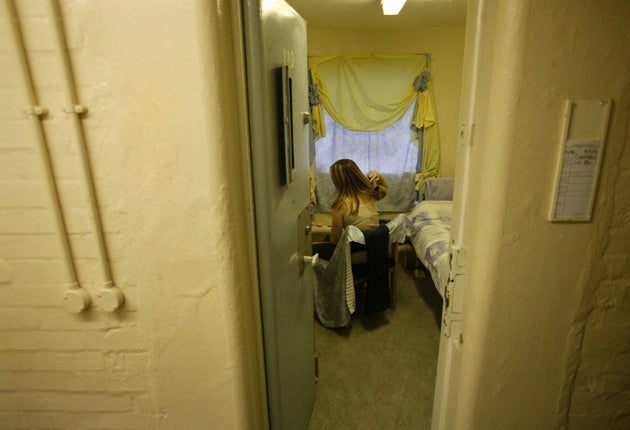Record numbers of women imprisoned
Female inmates up by 50 per cent in 10 years, with biggest rise in older women

A record number of women were imprisoned last year despite repeated promises by ministers to cut the female prison population.
English and Welsh courts jailed 8,862 women last year, the highest total on record. The number has risen by more than 50 per cent since 1998, when 5,849 were jailed, with the sharpest increases among older offenders. There are currently 4,293 female prisoners, a fall of just 32 since a year ago.
The surge in custodial sentences suggests that more lower-level offenders are being jailed for shorter periods. More than two-thirds of women prisoners are serving time for non-violent offences such as shoplifting. The vast majority are known to have mental health problems and many are drug users.
MPs and penal reform groups last night blamed the situation on ministers failing to act on a call from a government-commissioned report for an overhaul in the women's prison system.
David Howarth, the Liberal Democrat justice spokesman, said there was no evidence women committed more serious offences during the year.
He said: "The Government's record of locking up women is nothing short of a disgrace. The rise in older women, including pensioners, being put behind bars is particularly alarming."
Mr Howarth added: "Prison is not the right place for offenders who pose no threat to the public, particularly drug addicts and the mentally ill. Abandoning children by incarcerating their mothers is one of the best ways of creating a new generation of offenders."
A dramatic rise was recorded over the past decade in almost every age group. A total of 368 women aged 50 or over, including 55 pensioners, were jailed last year – an increase of 139 per cent over the decade. The number of women in their 40s who were imprisoned went up by 127 per cent, while 66 per cent more women in their 30s and 38 per cent more women in their 20s were jailed.
The number of women aged 18 to 20 who received custodial sentences rose by 25 per cent, with 15 to 17-year-olds the only group to record a drop.
The Association of Women Barristers will call this week for some women prisoners to be released on weekdays so they can spend more time with their children. It believes the move will cut levels of self-harm.
Juliet Lyon, the director of the Prison Reform Trust, called the increase in prison sentences "shameful" and protested that the rate of women's incarceration was "growing out of all control and proportion to the crimes they have committed".
She said: "Women's prisons are not full of serious and violent offenders. Instead they are being used as stop-gap, cut-price providers of drug detox, mental health assessment and shelter – a dumping ground for those failed by public services."
Maria Eagle, the Justice minister, said last year that she believed the Government could achieve a "significant" cut in numbers of women prisoners. She promised a concerted drive to persuade magistrates to look at tough alternatives to jail for female offenders.A Ministry of Justice spokesperson said yesterday: "We are committed to diverting vulnerable women, who are not serious or dangerous offenders, from custody. In order to do this, we have provided £15.6m of new funding over two years for the provision of additional services in the community for women at risk of offending or who are in the criminal justice system."
*Iain Duncan Smith, the former Tory leader, will call today for prison sentences of two months or less to be scrapped and replaced with tougher probation courses. He will arguethat such short terms are "farcical" and do nothing to help rehabilitate serial offenders. He will say that very short sentences "fuel the chaos of overcrowding".
Join our commenting forum
Join thought-provoking conversations, follow other Independent readers and see their replies
Comments
Bookmark popover
Removed from bookmarks